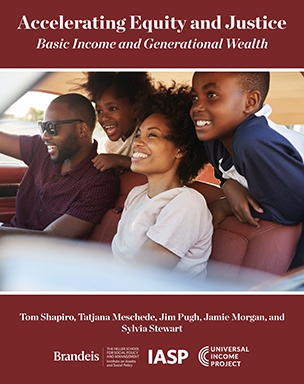
April 14, 2020 – Today, the Institute on Assets and Social Policy (IASP) at the Heller School for Social Policy and Management at Brandeis University released bold findings on the promise of cash transfers and child savings accounts to alleviate daily financial struggles, reduce poverty, and build generational wealth.
Accelerating Equity and Justice: Basic Income and Generational Wealth reveals how combined monthly Basic Income and Kids’ Futures Accounts promote family economic mobility at an unprecedented scale. When put to work in tandem, these programs have the power to eliminate income and asset poverty for U.S. households virtually and significantly increase racial wealth equity.
“Normal” was the problem before COVID-19, which now exposes our economic, social, and health vulnerability and utter inadequacies of our safety net infrastructure,” says IASP Director Thomas Shapiro. “We need an economy that works for all, that is good for the nation, and provides prosperity and human development, an economy that fairly allocates our tremendous productive wealth.”
In our current landscape of uncertainty, “Accelerating Equity and Justice” provides a plan to disrupt poverty and put our nation on the path to equity, justice, freedom, dignity for all.
In this report we show that:
- $1,000 per month Basic Income payments dramatically lower the poverty rate, most noticeably for people of color, and eliminate poverty in key groups.
- Kids’ Futures Accounts significantly increase the wealth of Black and Latinx families and put racial wealth equity in reach.
“The impacts for this bold policy are incredibly impressive, transformative, disruptive, popular, and doable," says IASP Associate Director Tatjana Meschede, Associate Director of IASP and co-author of the report. “Cash transfers coupled with generational wealth policy, eliminate barriers, remove economic traps, and provides access for equity and justice for all.”
Accelerating Equity and Justice focuses on the promise of guaranteed basic income and generational wealth accumulation to alleviate poverty, shift narratives that question the deservedness of social assistance and lessen racial wealth inequality. The report highlights the urgent need for bold, disruptive, and transformational policy with equity, well-being, and racial justice at the center.
In this time of pandemic, universal cash transfers are touted as the emergency solution to one of the greatest disasters of our time. Economic justice always requires a commitment to security for all, not just a one-time payment in the time of emergency.
Read the full report on the IASP website.
About IASP
The Institute on Assets and Social Policy (IASP), located at the Heller School for Social Policy and Management at Brandeis University, works to improve our understanding of inequality by examining how assets and asset-building opportunities impact the well-being, financial security, and social and economic mobility of individuals, families and communities, particularly those left out of America’s economic mainstream. In collaboration with our research partners, constituency groups, and practitioner organizations, we use a racial equity lens to explore the role that assets play in inequality and insecurity, and the structural and institutional barriers to asset development.
REPORT AUTHORS:
Tom Shapiro, Tatjana Meschede, Jim Pugh, Jamie Morgan, and Sylvia Stewart
